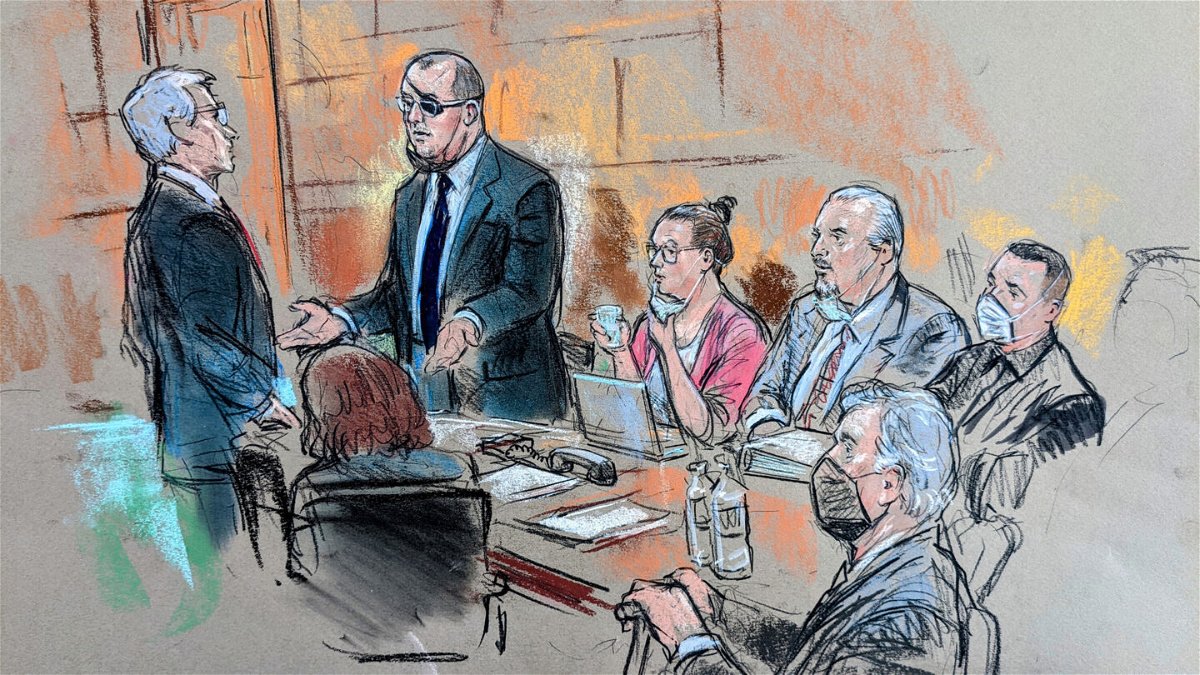Breaking down the significant turmoil that’s unfolded in the Oath Keepers trial

The seditious conspiracy trial of five alleged Oath Keepers leaders has become mired in conflict as prosecutors called defense witnesses to warn them against self-incrimination in the days before they take the stand.
By Hannah Rabinowitz and Holmes Lybrand, CNN
The seditious conspiracy trial of five alleged Oath Keepers leaders has become mired in conflict as prosecutors called defense witnesses to warn them against self-incrimination in the days before they take the stand, defense attorneys accused one another of unethical conduct and one witness was revealed to be an informant.
Between the unmasking of a secret informant who had a medical emergency before appearing in court and a last-minute refusal to testify, there has been significant turmoil in recent days over witnesses the defense wants to call and how the trial will proceed.
On Tuesday, attorneys for Stewart Rhodes called a Florida member of the Oath Keepers, Dario Aquino, to the witness stand. Aquino spent much of the afternoon of January 6, 2021, with Rhodes, and defense attorneys planned to use his testimony to argue that Rhodes had no insight into the violence that was unfolding at the Capitol. Rhodes is the Oath Keepers’ leader.
In a surprise turn, Aquino took the stand and immediately invoked his Fifth amendment rights, refusing to testify. Rhodes’ attorney, James Lee Bright, looked shocked and asked federal Judge Amit Mehta, who is overseeing the trial, to excuse the jury from the courtroom.
A heated argument unfolded between Bright and Aquino’s lawyer Dwight Crawley, as Crawley alleged he had no idea Aquino planned to testify until prosecutors warned him the night before, calling it “insane” for him to testify.
“They want to take their questionable ethical activity and use it to their advantage,” Crawley shouted in the courtroom. “They want to put that individual on the witness stand for their self-gain.”
Bright responded, saying he would not let Crawley accuse him of unethical behavior “without fighting back,” and that he believed Crawley previously knew Aquino was going to testify. Mehta interrupted the shouting match, telling the lawyers to “cool down” before sending Bright, Crawley and a third defense attorney acting as a mediator into the hallway to work out the issue.
Aquino’s testimony is at the heart of a bitter fight between defense attorneys and the Justice Department over prosecutors contacting defense witnesses before they take the stand — especially members of the Oath Keepers — and warning them that, if they testify, they open themselves up to self-incrimination and potential prosecution down the road.
“I’m personally concerned about disclosing who I want to call next,” Stanley Woodward, an attorney for another accused Oath Keeper, Kelly Meggs, said Tuesday, adding that he would give the government no more than a 24-hour notice of who he intended to call to the stand.
Prosecutors said in court that it was their legal obligation to warn witnesses of any exposure they might have, and that while prosecutors had asked defense attorneys if they informed witnesses of their Fifth Amendment rights, they never heard back.
“We did what we thought we were obligated to do, which is tell defense counsel if we think a witness has a Fifth Amendment issue,” prosecutor Jeffrey Nestler said Tuesday.
Mehta said that the defense should acknowledge that witnesses have their own rights to look out for.
“I don’t know what to tell you all. This is not unusual in the sense that when defense wants to call defense witnesses, those witnesses might have some exposure. That’s not unusual. And then the question becomes does that witness wish to testify,” the judge said.
“If you believe there is anything that is unethical about what they’ve done, or an FBI agent has done, or that has crossed the line in some way, then let me know,” Mehta added, speaking to the defense lawyers.
Witness revealed as confidential informant
Another witness defense attorneys for Rhodes wanted to call, Greg McWhirter, the former vice president of the Oath Keepers, was revealed to be a confidential informant against the group.
The New York Times reported Thursday afternoon that McWhirter was an informant, a fact that the Justice Department confirmed in a sealed filing accidentally published on the public docket Tuesday night.
In the filing, prosecutors asked Mehta to grill defense attorneys about who leaked McWhirter’s status as an informant to the Times. That information, prosecutors said, was marked as “highly sensitive” and was covered by a protective order.
“The government asks the Court to take these steps because of the substantial security and health concerns triggered by the premature leak of Mr. McWhirter’s status as a CHS,” or confidential human source, prosecutors wrote in the filing. “Even prior to this disclosure to the NY Times, Mr. McWhirter conveyed to the government tremendous anxiety about his status as a confidential informant being publicly revealed.”
The allegation sent defense lawyers scrambling, according to a person familiar with their conversations, with several lawyers assuring one another they were not the source of the leak.
Mehta took up the issue under seal with both parties in the courtroom Wednesday morning “given the sensitivities we need to discuss.”
McWhirter, who was scheduled to testify Tuesday, also suffered from a medical emergency on the plane he was supposed to take to Washington, DC, and will no longer be able to travel to testify in person, according to defense attorneys and the DOJ filing. It’s possible that McWhirter will be allowed to take the stand over video conference this week, though the timing is still unclear. McWhirter has not been charged with a crime related to January 6.
McWhirter’s status as an informant is not the first piece of protected information allegedly leaked to the press. As the trial began, disbarred lawyer Jonathan Moseley, who previously represented defendant Kelly Meggs, sent several emails to defense attorneys, prosecutors, and attorneys for media outlets threatening to release information to the public he believed was exculpatory.
Moseley allegedly did give some of the information to a right-wing outlet, and Mehta held a hearing on whether Moseley should be held in contempt of court for violating the protective order. No official decision was made on the matter.
The hearing was supposed to be sealed but was accidentally aired to a media room in the courthouse where reporters have been watching the trial unfold.
“You look like you have bad news for me,” Mehta said at the end of the sealed proceeding as his courtroom deputy rushed to the bench. The deputy was standing back from the microphone, so reporters could not hear what he was saying.
“So they could hear everything” Mehta asked, and the line to the media room cut out.
The-CNN-Wire
™ & © 2022 Cable News Network, Inc., a Warner Bros. Discovery Company. All rights reserved.


